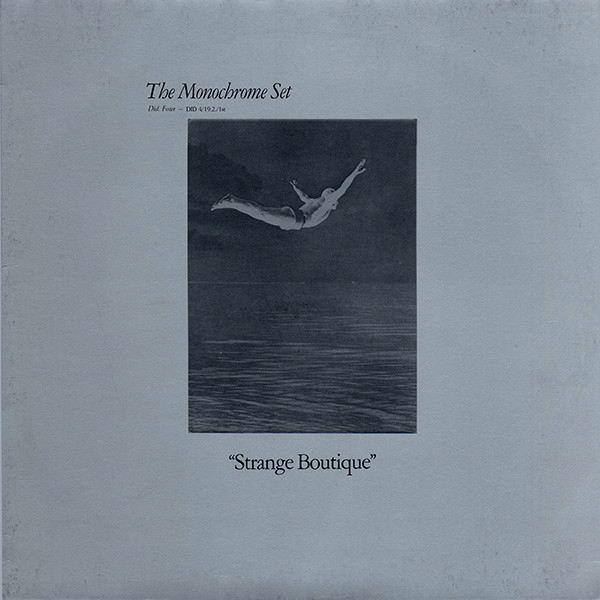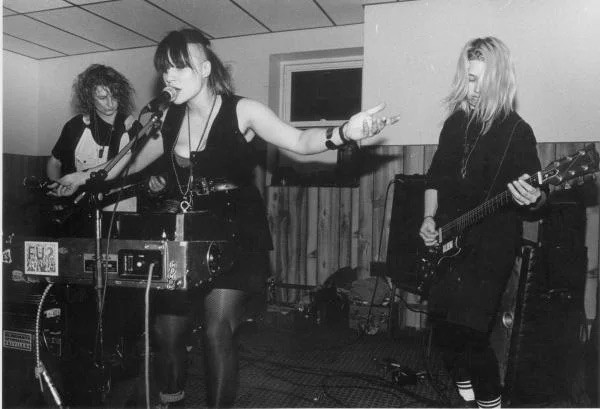
Formada em Joanesburgo, em 1986, a N.F.O.H. (sigla para No Friends Of Harry) detém com justiça o título de primeira banda gótica e alternativa da África do Sul. Em uma cena musical ainda incipiente e marcada pelas amarras do apartheid, o grupo surgiu como uma exceção barulhenta e noturna, abrindo caminho para toda uma geração de artistas que viam nas sombras um espaço de expressão e resistência.
Em um país cuja música alternativa enfrentava enorme dificuldade de circulação, a N.F.O.H. conquistou notoriedade graças à frequente execução de suas faixas no programa "Shadow Show", apresentado por Barney Simon na Radio 5 uma espécie de John Peel sul-africano, fundamental na divulgação do pós-punk e do rock alternativo no país.
Com uma postura fieramente independente, a banda era impulsionada pela bateria incisiva de Annette McLennan e pelos vocais graves e cavernosos de Rob McLennan, seu companheiro e parceiro criativo. Ao lado deles, Dave de Vetta (baixo), Ian Wiggins (guitarra) e Adrian Hamilton (teclados ocasionais) completavam a formação.
Mark Williams, seu empresário, ganhou fama por seu envolvimento performático e por vezes caótico – inclusive, segundo relatos, “ateando fogo em coisas” durante os shows ou ensaios, num espírito punk que refletia o clima instável da época. A discografia da banda inclui três álbuns essenciais para quem deseja compreender a gênese da cena alternativa africana:
"One Came Running" (1987) – Lançado de forma quase artesanal, é uma estreia crua e intensa, trazendo influências de The Birthday Party, Bauhaus e até toques de Southern Death Cult.
"Into The Valley" (1989) – Editado pelo selo independente Principal, marca a consolidação do som da banda, com camadas mais atmosféricas e uma produção levemente mais polida.
"Fifteen Seconds" (1991) – Lançado pelo selo Clear Cut, é talvez o trabalho mais maduro do grupo, com letras que abordam desde alienação urbana até relações pessoais atravessadas por inquietude e desencanto.
Antes de encerrar as atividades, a banda lançou ainda a coletânea "Fly By Night", um apanhado de faixas essenciais e raridades. O fim da N.F.O.H. veio em setembro de 1998, quando o baixista Dave de Vetta emigrou para a Escócia um golpe difícil de contornar em uma cena com poucos substitutos à altura.
Ainda hoje, a N.F.O.H. permanece como um símbolo poderoso do que foi fazer música sombria em um país mergulhado em censura, desigualdade e violência. Entre os ecos do pós-punk britânico e a realidade brutal da África do Sul dos anos 80, o grupo deixou um legado cult, cultuado por colecionadores e resgatado por pesquisadores sonoros que se debruçam sobre as cenas alternativas do Hemisfério Sul.
Singles & EPs
The Present Has Passed 1988
Fade Away / The Price You Pay 2018
Coletâneas
Fly By Night (1986-1998)
The Present Has Passed: The Best Of No Friends Of Harry 2003
No Friends Of Harry
Formed in Johannesburg in 1986, N.F.O.H. (short for No Friends Of Harry) justly holds the title of South Africa's first gothic and alternative band. In a nascent music scene constrained by the shackles of apartheid, the group emerged as a noisy and nocturnal exception, paving the way for a whole generation of artists who saw the shadows as a space for expression and resistance.
In a country where alternative music faced enormous circulation difficulties, N.F.O.H. gained notoriety thanks to the frequent airplay of their tracks on the "Shadow Show" program, hosted by Barney Simon on Radio 5 – a kind of South African John Peel, fundamental in promoting post-punk and alternative rock in the country.
With a fiercely independent stance, the band was driven by the incisive drumming of Annette McLennan and the deep, cavernous vocals of Rob McLennan, her partner and creative collaborator. Alongside them, Dave de Vetta (bass), Ian Wiggins (guitar), and Adrian Hamilton (occasional keyboards) completed the lineup.
Mark Williams, their manager, gained fame for his performative and sometimes chaotic involvement – including, according to reports, "setting things on fire" during shows or rehearsals, in a punk spirit that reflected the unstable climate of the time. The band's discography includes three essential albums for anyone wishing to understand the genesis of the African alternative scene:
Albums
- "One Came Running" (1987) – Released in an almost artisanal way, it's a raw and intense debut, bringing influences from The Birthday Party, Bauhaus, and even touches of Southern Death Cult.
- "Into The Valley" (1989) – Released by the independent label Principal, this album marked the consolidation of the band's sound, with more atmospheric layers and a slightly more polished production.
- "Fifteen Seconds" (1991) – Released by the Clear Cut label, this is perhaps the group's most mature work, with lyrics that address everything from urban alienation to personal relationships crossed by unease and disillusionment.
Before disbanding, the band also released the compilation "Fly By Night", a collection of essential tracks and rarities. The end of N.F.O.H. came in September 1998, when bassist Dave de Vetta emigrated to Scotland – a difficult blow to overcome in a scene with few suitable replacements.
Even today, N.F.O.H. remains a powerful symbol of what it was like to make dark music in a country steeped in censorship, inequality, and violence. Between the echoes of British post-punk and the brutal reality of 1980s South Africa, the group left a cult legacy, revered by collectors and rediscovered by sound researchers who delve into the alternative scenes of the Southern Hemisphere.
Singles & EPs
- The Present Has Passed (1988)
- Fade Away / The Price You Pay (2018)
Compilations
- Fly By Night (1986-1998)
- The Present Has Passed: The Best Of No Friends Of Harry (2003)




















